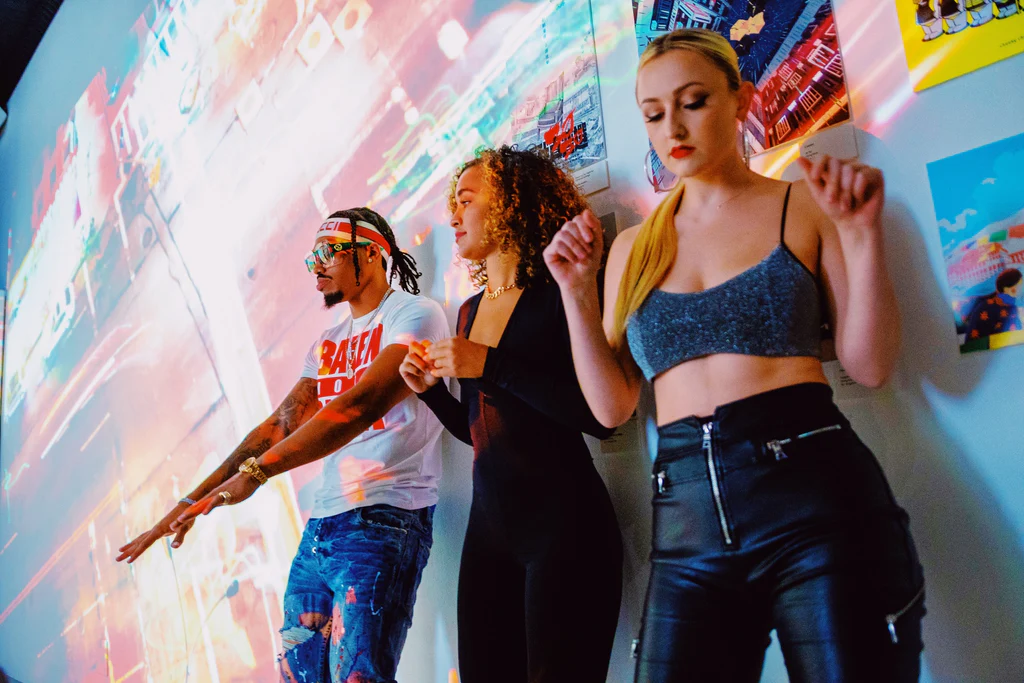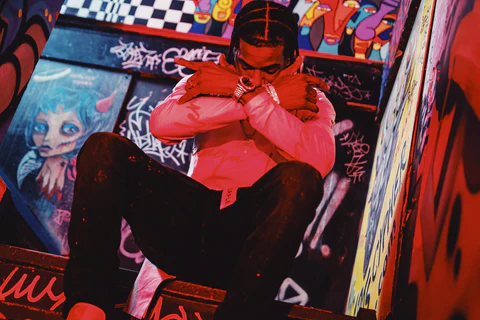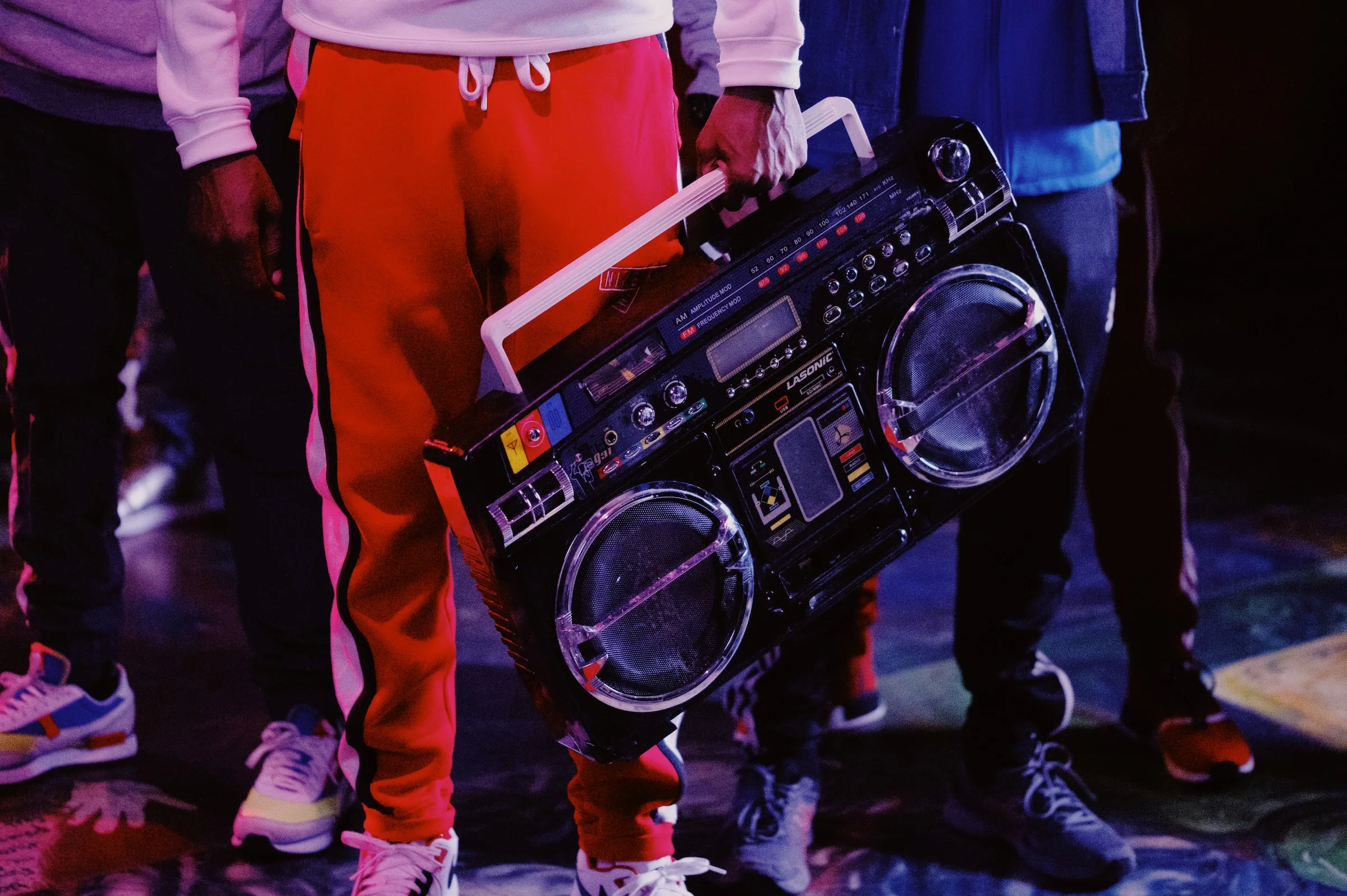Hip-hop is an important part of the music and culture landscape today. It’s a genre that has influenced many other genres, from rap to EDM and beyond.
Hip-hop originated in the Bronx in New York City during the late 1970s and early 1980s. It was pioneered by DJs such as Afrika Bambaataa and Grandmaster Flash who used turntables to create a unique soundscape with loops, samples, scratching, and spoken word.
The look of hip-hop is also distinctive. Many artists have their own signature style which often includes oversized clothing, designer sneakers, bandanas or hats are worn sideways, jewelry (including chains), and gold teeth grills. The baggy clothes are designed to be comfortable but also stylish – they can help express individuality while still being practical for dancing at parties or events where movement is essential.
At its core hip hop has always been about self-expression; it provides an outlet for people to share their stories through lyrics or spoken word poetry over beats produced using samples from other songs or records combined with electronic instruments such as drum machines.
This combination allows artists to create something new while paying homage to those who came before them – something that sets hip-hop apart from other genres of music.
Hip Hop also encourages community engagement through ciphers (where MCs battle against each other) as well as events like graffiti jams where graffiti artists come together in public spaces around cities like NYC or LA to paint walls together creating unique pieces of art for everyone to enjoy. In this way, it brings people together both physically & virtually through social media platforms like YouTube & Instagram making it easier than ever for fans all over the world to connect with one another regardless of location!
Hip Hop helps promote positive messages about social issues such as racism & police brutality by giving voice to those who may not otherwise be heard – allowing these stories & perspectives to reach wider audiences & inspiring change within our society on a global scale.

Hip-Hop: A Cultural Phenomenon
Hip-hop has become a ubiquitous phenomenon in the past several decades, providing an outlet for expression and creative exploration. A powerful medium of communication, hip-hop is an amalgamation of many cultures and influences that transcend geographical boundaries.
It encompasses elements such as rap music, graffiti art, dance moves, and fashion trends. Hip-hop has often been seen as a reflection of urban life – but its influence reaches far beyond city limits to all corners of the world.
Hip-hop provides a platform for people from different backgrounds to come together through their shared love for this unique culture. From large festivals to local gatherings, it offers an opportunity for connection and unity among fans who have similar interests yet may come from very different places or circumstances. In addition to being about artistic expression, hip-hop also serves as a way for individuals to express themselves in ways they otherwise wouldn’t be able to do so with traditional means like conversation or writing – thus making it both inclusive and empowering on multiple levels.
The impact of hip-hop goes further than just providing entertainment value; it also helps bring awareness around important social issues such as racism, poverty, and inequality while inspiring people around the world with its message of hope and resilience in the face of adversity. With its vibrant beats mixed with meaningful lyrics, hip hop has been successful in engaging audiences across generations and cultures alike – proving itself time after time why it’s one of today’s most beloved genres worldwide.
The Origins of Hip-Hop: the Birth of Movement
The origins of hip-hop can be traced back to the early 1970s in New York City. This movement was a cultural revolution that allowed many young people, especially African Americans, and Latinos, to express themselves through music and dance. The first hip-hop songs were created by DJs using two turntables, samples from other records, and drum machines. They would scratch on the records to create unique sounds as they spun them. Rappers emerged onto the scene shortly after; often taking snippets from popular songs or spoken word poetry to craft their own lyrics about topics like social injustice, poverty, and racism.
Throughout its history, Hip Hop has been an incredibly powerful form of expression for disenfranchised communities around the world – providing an outlet for individuals who have experienced oppression or marginalization due to race, class, or gender identity. From political rallies against police brutality to fundraisers for at-risk youth programs; it is clear that Hip Hop has served as a platform for positive change over the years. By utilizing Hip-Hop influence within a pop culture – this genre has become a driving force behind movements such as Black Lives Matter and Me Too – inspiring people everywhere to speak up against inequality in all forms.
In addition to being used as a tool for activism; Hip Hop has also been credited with changing how we view music production today. Through sampling techniques pioneered by early pioneers like Grandmaster Flash & Afrika Bambaataa – producers are now able to make use of previously recorded material in order to construct new beats without ever having access to physical instruments. This advancement not only revolutionized how rap tracks was made but opened doors for electronic genres such as EDM which rely heavily on prerecorded samples mixed together in creative ways.
Hip-Hop Music: The Greatest Hip-Hop Albums
Hip-hop music has been a cornerstone of popular culture since its inception in the 1970s. Throughout the years, hip-hop albums have been released that have pushed boundaries and influenced generations of fans. From classics like The Chronic by Dr. Dre to modern masterpieces like To Pimp A Butterfly by Kendrick Lamar, there are a plethora of hip-hop albums that can be considered among the greatest ever created.
The groundbreaking album Illmatic by Nas is often regarded as one of the best rap albums ever recorded and it set an incredible standard for future releases in terms of production quality and lyricism. Another iconic record from 1994 was Ready to Die by Notorious B.I.G. Which boasted sharp storytelling skills over soulful beats and helped usher in an era known as “gangsta rap” that would become incredibly influential on hip hop culture at large throughout the next two decades or so.
More recently, artists such as J Cole, Drake, Travis Scott, and Cardi B have taken center stage with their own unique styles – all while pushing forward with new sounds and innovations within hip-hop music itself. While there will always be debates about which records deserve to be included amongst the pantheon of greats; each artist brings something special to the table that further enriches this genre’s remarkable history.
The Power of Lyrics: How Hip-Hop Addresses Social Awareness
Hip-hop is an art form that has not only captivated audiences around the world but also served as a platform for voicing opinions and addressing social issues. Through its lyrics, hip-hop artists have used their music to bring attention to matters of injustice and discrimination in our society. This form of expression has provided a unique outlet for individuals to share their stories, struggles, and experiences with the public in ways that other forms of media cannot replicate.
The power of hip-hop lies in its ability to deliver messages with raw emotion. Artists are able to communicate deep-seated feelings through words and melody which helps listeners connect on an emotional level with what they hear. By doing so, they can create powerful songs that reach people’s hearts and spark conversations about important topics such as racism, sexism, or poverty.
This type of storytelling enables artists to create awareness about societal problems without resorting to explicit language or over-the-top imagery as some other genres do; instead, it relies on subtlety and cleverness when conveying its message.
Many prominent hip-hop figures have taken up this cause by using their fame as a way of speaking out against oppression or rallying support for positive causes such as education reform or mental health initiatives.
Their work often encourages people from all walks of life–from youth activists fighting for change in their communities to adults who may be facing tough times–to stand together against injustice wherever it appears.
In this way, hip hop continues to be one of the most effective tools available today for raising awareness among different groups within our society while inspiring us all at the same time towards meaningful action that can help make our world a better place overall.
The Rise of Hip-Hop Artists: From Sugarhill Gang to Kendrick Lamar
Hip-hop is a genre of music that has been growing in popularity since the early days of rap. The Sugarhill Gang’s single “Rapper’s Delight” was released in 1979 and marked the beginning of hip-hop as a genre. Since then, there have been countless other hip-hop artists who have made their mark on the industry, including Tupac Shakur, Biggie Smalls, Jay Z, Nas, and more recently Kendrick Lamar.
Kendrick Lamar is one of the most influential rappers today with his mix of conscious lyrics about social issues combined with upbeat instrumentals. He has won numerous awards for his work including 12 Grammy Awards and he even became the first non-classical or jazz artist to win a Pulitzer Prize for Music for his 2017 album DAMN. His success shows how much impact an artist can have by being creative and outspoken about important topics through their artistry.
The evolution from Sugarhill Gang to Kendrick Lamar also demonstrates how far hip-hop has come as a genre; it has gone from being largely overlooked to becoming mainstream and accepted worldwide thanks to its ability to reach people on both intellectual and emotional levels. This goes beyond just popular music – it speaks volumes about society’s progressiveness in embracing different cultures while still respecting those that came before them such as funk pioneers like James Brown or soul singers like Aretha Franklin whose influence can be heard throughout contemporary hip hop tracks today.

The Hip-Hop Nation: A Global Community of Fans and Artists
Hip-hop became an international phenomenon, connecting people from all walks of life and forming a powerful global community. This is the Hip-Hop Nation: a collective of individuals united by their love for hip-hop culture. From underground clubs to major festivals, hip-hop fans come together to share their enthusiasm and show appreciation for the genre’s many forms.
At its core, hip-hop is about expression – it allows anyone with a voice to tell stories in unique ways and reach out to others who can relate. Through this art form, people have found solace in the struggles they face on a daily basis, from racism and sexism to poverty and violence. By sharing these experiences through song lyrics or dance moves, listeners can gain empathy for those around them who are dealing with similar issues.
The Hip-Hop Nation also provides an outlet for creative collaboration between artists of different backgrounds who might not otherwise cross paths due to geographic or economic barriers. With platforms like SoundCloud providing opportunities for producers and rappers alike to connect online regardless of where they live in the world; regional styles from far corners merge into one sound that unites everyone under the same banner of “hip hop”. Aspiring MCs benefit immensely as they get feedback from other members around the globe while developing their craft – something that would have been impossible just two decades ago before technology allowed us all to come together as one big family over our mutual love of rap music.
Hip-Hop Through Time: The Soundtracks of Our Lives
Hip-hop has been a cultural phenomenon since its emergence in the late 1970s. It is now seen as one of the most influential genres of music and entertainment, not only on a global scale but also across generations. From its humble beginnings in New York City to become an international powerhouse that transcends all boundaries, hip-hop has had an incredible impact throughout time.
The earliest days of hip-hop saw the birth of iconic subgenres such as rap, breakdancing, and graffiti art. These forms were adopted by youth from diverse backgrounds who created their own unique styles and sounds based on what they heard around them. Through these early years, hip-hop served as a platform for self-expression for those living in impoverished neighborhoods who felt underrepresented or ignored by mainstream society at large. This form of expression helped create strong bonds between individuals and communities, leading to increased pride and confidence in each group’s identity.

Throughout the decades, hip-hop has continued to evolve musically with more modern variations such as trap music being embraced by younger generations today; however, it still remains true to its core values: creating positive change through soundtracks that empower people everywhere regardless of age or race.
Hip-hop continues to be an important source of inspiration for millions around the world while simultaneously providing us with some unforgettable memories over time – making it truly one genre worth celebrating.
Rappers as Cultural Icons: Examining Their Impact on Society and Youth Culture
Rappers have become an undeniable part of popular culture, captivating audiences with their creative flow and lyrical prowess. Over the last several decades, they’ve transcended musical genre boundaries to become a mainstream phenomenon. Their influence is far-reaching, and not only in the music industry.
The reach of hip-hop has extended beyond entertainment value into areas such as 1990s fashion and politics. Rappers are often seen as trendsetters, pushing the envelope when it comes to what’s socially acceptable in terms of clothing styles or language usage. They also play an important role in voicing social justice issues by speaking out on matters like police brutality or immigration policies. As a result, many young people look up to rappers as role models for how to express themselves politically and creatively – helping them create their own unique identity that stands out from traditional norms within society.
It’s clear that rap has come a long way since its beginnings on the streets of New York City in the late 1970s; today it continues to be one of the most influential genres across cultures around the world – no matter where you go there will always be someone rapping along. Its importance lies not only in its potential for artistic expression but also in its ability to empower those who may otherwise feel voiceless or ignored by larger institutions – making it an invaluable tool for inspiring change within our communities.
Summary
In conclusion, hip-hop has undoubtedly played a pivotal role in shaping American culture and giving voice to marginalized communities. Since its inception in the Bronx during the 1970s, hip-hop has provided a platform for black and Latino youth to express their socio-political discontent, share their stories, and advocate for social change. Artists like N.W.A., Kendrick Lamar, and Doja Cat have used the power of their lyrics to challenge the status quo and inspire a new generation of black youth.
While hip-hop has faced its fair share of controversy surrounding themes of violence, crime, and materialism, it’s important not to negate the fact that the genre is built on values of social justice and self-worth. From its rhythmic beginnings with DJ Kool Herc to today’s diverse range of artists, hip-hop continues to be a force for change in today’s society, tackling issues of race, socio-economic disparity, and self-love.

So, whether you’re nodding your head to the beats of classic “gangster rap” or the latest tracks promoting social justice.
Remember that hip-hop’s impact on American culture runs deep.
It’s a way of living, an expression of blackness, and a powerful tool for change that transcends music and resonates throughout the United States and beyond. Let the legacy of hip-hop continue to inspire, challenge, and unite us all.
FAQs
How has hip-hop music impacted American culture and helped marginalized communities?
Hip-hop emerged in the Bronx in the 1970s and has since become an essential part of American culture. It has given marginalized communities, particularly black communities, a voice to express their experiences and concerns. The genre has tackled issues like the treatment of African Americans, social justice, and empowerment, making it an influential force for change.
Why is hip-hop considered a unique and powerful music genre?
Hip-hop is a unique music genre because it combines rhyme, rhythm, and storytelling to convey powerful messages and emotions. It has the ability to evoke strong feelings and address socio-political issues, making it an influential medium for social change. Furthermore, hip-hop’s roots in black culture have helped it become an authentic representation of the experiences and challenges faced by marginalized communities.
What are some common criticisms surrounding hip-hop music, and how do they affect the genre’s overall message?
Hip-hop music often faces criticism for its provocative lyrics, profanity, and themes of violence and crime. These negative connotations can sometimes overshadow the genre’s messages of empowerment, social justice, and cultural expression. However, many artists and fans argue that hip-hop’s controversial elements are part of its unique ability to address complex and challenging issues head-on.
How has hip-hop evolved since its inception in the 1970s?
Since the first hip-hop songs emerged in the Bronx, the genre has evolved and grown to encompass a wide range of styles, themes, and messages. From the early days of MCs and DJs to the more recent rise of social media-driven artists, hip-hop has continually adapted to changing cultural and technological landscapes. Throughout its evolution, hip-hop has remained a powerful force for expression and change, inspiring generations of fans and artists alike.
How does hip-hop music promote self-expression and empowerment, especially for black men and women?
Hip-hop music has long been a powerful platform for self-expression and empowerment within the black community. It allows artists to address personal experiences and societal issues, giving them a voice that is often marginalized in mainstream media. By celebrating the achievements of black men and women, hip-hop music reinforces their sense of self-worth and encourages them to challenge societal norms and expectations.
How can hip-hop music be used as a tool for education and social change?
Hip-hop music can serve as a valuable educational tool, with artists like Kendrick Lamar and rapper Snoop Dogg tackling complex social issues in their lyrics. School counselors and social workers can use hip-hop music to engage with students, helping them understand and discuss important topics like civil rights, racial inequality, and social justice. By incorporating hip-hop into educational settings, we can foster critical thinking, and open dialogue, and ultimately drive social change.






